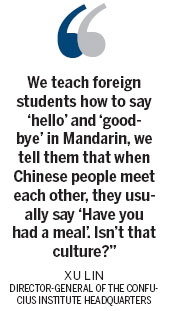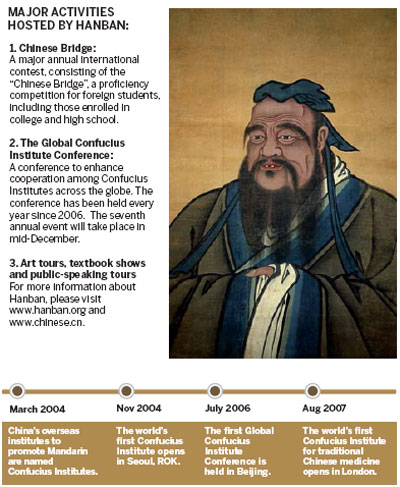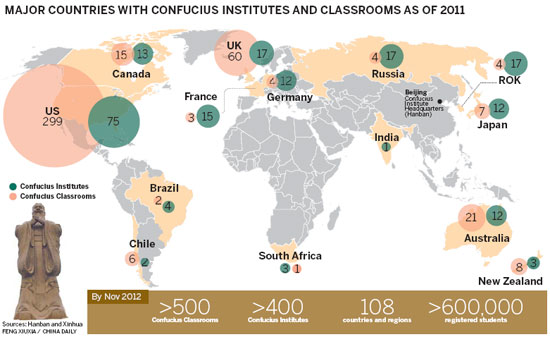Confucius Institutes go beyond borders
Updated: 2012-12-03 07:42
By Qu Yingpu, Zhao Huanxin and Cheng Yingqi (China Daily)
|
||||||||
A global lesson in reaching out to make a world of difference
Confucius, the ancient Chinese teacher and philosopher, was renowned for many things, including extensive travels during the Spring and Autumn Period (770-476 BC). It is little wonder that those affiliated with the institutes that have taken his name are similarly itinerant.
While Confucius preached moral codes and ways of governance, the Confucius Institutes help people break language barriers to better know each other - a mission that necessitates a great deal of travel.
One of the most noteworthy instances of this was an excursion to Japan in October. Relations between China and Japan have been festering following tensions over the Diaoyu Islands, a cluster of islets in the East China Sea.
Hundreds, maybe thousands, of Tokyo-bound trips had been cancelled, but not for the Confucius Institute Headquarters in Beijing, which sent a vice-director to the Japanese capital to meet teachers and volunteers from the Confucius Institutes in Japan.
"You wouldn't believe it - there were only six people flying on a big plane to Japan that day," said Xu Lin, director-general of the Confucius Institute Headquarters, known as Hanban.
"The more two countries' ties deteriorate over political issues, the more important it is for Confucius Institutes to play a role in helping preserve and strengthen the rapport between the people of the two nations," Xu said.

Since the founding of the first Confucius Institute in Seoul eight years ago, the development of this organization has ballooned beyond all expectations, especially in developed countries.
According to Xu, the non-government organization is designed to teach foreigners Chinese and immerse them in oriental culture.
There are currently more than 400 Confucius Institutes in 108 countries and regions, and more than 500 Confucius Classrooms - with more than 600,000 registered students - across the globe, according to statistics released earlier this year.
In addition, 70 of the world's top 200 universities have opened their own Confucius Institutes.
"There are still more than 400 universities in 76 countries waiting on the candidate list for Confucius Institutes," she said.
Hanban is the international provider of teaching resources and services for Chinese language and culture.
Unlike other international education institutes, such as Alliance Francaise and the Goethe Institute, the Confucius Institute Headquarters closely cooperates with foreign universities and schools to improve their Mandarin teaching.
The universities and schools that would like to open Confucius Institutes have to meet certain requirements set by the headquarters, and submit applications.
Xu has looked beyond the explosion in the number of chain-store-like education institutes in the Western world and wants to optimize the layout of Confucius Institutes across the world.
"Although we do not open new Confucius Institutes on our own initiative, I would like to further increase the presence of Confucius Institutes in our neighboring countries as well as in the BRICS countries (Brazil, Russia, India, China and South Africa)," Xu said.
"The BRICS countries all have a big population. China's economic and political connection with them, and the neighboring countries, is getting closer, so we can focus more on these countries."
In recent years, she has also noticed a surge in demand for Mandarin teaching in these regions.
More and more students from Thailand, Myanmar and Laos have come to China to study Mandarin, while Mandarin is taught in some primary schools in Japan, the Republic of Korea and Mongolia.
However, promoting Mandarin in less-developed regions is not easy, and attracting qualified teachers and volunteers is one of the biggest problems.
"There are some practical difficulties for the teachers," Xu said, explaining that Mandarin teachers sent to some developing countries have to deal with certain problems.
Xu has increased the subsidy given to teachers and volunteers to encourage more of them to go to developing countries.
On the other hand, the fundamental solution is to help train local Mandarin teachers, she said.
In November, the Confucius Institute Headquarters launched a new project, the Confucius China Study Plan, which supports foreign students seeking to complete PhD programs in designated academic areas of the humanities and social sciences in China, or sponsors experts and outstanding students for short-term exchanges.
"The project will help cultivate local teachers who could play a key role at the Confucius Institutes in their home countries, so that development of the institutes will be more sustainable," Xu said.
Confucius Institutes' work is misunderstood from time to time. Steven W. Mosher, a China specialist in the US, once called Confucius Institutes "Trojan Horses with Chinese characteristics" in his essays.
On May 17, without consulting China, the US government signed a controversial visa policy directive, according to which any teachers in US Confucius Institutes holding a J-1 visa would be forced to leave the US in six weeks.
The policy affected at least 51 Chinese teachers out of the 600 employed by the 81 Confucius Institutes across the US at the time.
Dozens of university presidents wrote letters to the US Department of State criticizing the policy directive. Eight days later, the US government changed the policy and promised it would not force the teachers to leave.
"The Confucius Institutes are definitely not Trojan Horses, since we are holding no weapons in our hands," Xu said.
"In 2011, only 12.5 percent of the institutes used textbooks published in China; the others used teaching materials composed in foreign countries, so we are not bringing any 'weapons' in our teaching.
"When we promote China's culture, we are not trying to force our values or traditions onto others. We teach foreign students how to say 'hello' and 'goodbye' in Mandarin, we tell them that when Chinese people meet each other, they usually say 'Have you had a meal'. Isn't that culture?"


(China Daily 12/03/2012 page1)

 Relief reaches isolated village
Relief reaches isolated village
 Rainfall poses new threats to quake-hit region
Rainfall poses new threats to quake-hit region
 Funerals begin for Boston bombing victims
Funerals begin for Boston bombing victims
 Quake takeaway from China's Air Force
Quake takeaway from China's Air Force
 Obama celebrates young inventors at science fair
Obama celebrates young inventors at science fair
 Earth Day marked around the world
Earth Day marked around the world
 Volunteer team helping students find sense of normalcy
Volunteer team helping students find sense of normalcy
 Ethnic groups quick to join rescue efforts
Ethnic groups quick to join rescue efforts
Most Viewed
Editor's Picks

|

|

|

|

|

|
Today's Top News
Health new priority for quake zone
Xi meets US top military officer
Japan's boats driven out of Diaoyu
China mulls online shopping legislation
Bird flu death toll rises to 22
Putin appoints new ambassador to China
Japanese ships blocked from Diaoyu Islands
Inspired by Guan, more Chinese pick up golf
US Weekly

|

|






